
Starting up a business is an outstanding achievement. Depending on the type of business you set up in Alberta, there are essential steps that you may need to take to get your business running. One of these steps is registering your business.
Registering a business is not as daunting as it seems. The process of registering a company in Alberta is straightforward. Keep reading to find out how to register or incorporate your business.
- Determining the legal form of your business
- Choosing and registering a business name
- Getting a business name report
- Completing your sole proprietorship or partnership business registration
- Final registration step
- Incorporating a business corporation
- What is the cost of registering a business in Alberta?
- Using a business account for your company
- Here Are the Best Credit Cards for Your Business in Canada
- Business Platinum Card® from American Express
- American Express Business EdgeTM Card
- American Express®Business Gold Rewards Card
- American Express® AIR MILES®* for Business Card
- American Express® AIR MILES®* Gold Business Card
- Frequently asked questions
Determining the legal form of your business
The first factor to consider when setting up a business is the legal form of your business. This is standard practice. Like other provinces, you can set up a business as a sole proprietorship, a partnership, a cooperative, a corporation, or a non-profit company in Alberta.
A sole proprietorship is a one-person business. You do not need to register your business if you operate as a sole proprietor. However, if you carry out your business using a name that is not your personal name, you are required to register your business name.
When you register a business name under a sole proprietorship, this is known as a trade name. If your business is set up as a partnership, limited partnership, or limited liability partnership, you need to register a business name. Registering a corporation goes way beyond registering a business name. Incorporating a business requires additional steps that will be discussed later.
Choosing and registering a business name
You can choose a business name to represent your business to the public. Registering a business name does not legally separate a sole proprietorship business or a partnership from the business owners. Owners of the business are responsible for the business's liabilities subject to any limited liability agreements in the case of a limited liability partnership.
You technically do not have a legal right to the name when you register a name for your sole proprietorship or partnership business. Another business can register a similar name. However, you may need to take caution and do a thorough check to avoid duplicating another business’s name, as this can result in lawsuits and legal damages payments.
Businesses operating as sole proprietorships or partnerships can choose any business name. However, certain restrictions apply. For example, if you do not run an incorporated business, you cannot include words such as limited, incorporated, or corporation that suggest you have a registered corporation. You also cannot use the French variations or abbreviations of these words in your business name.
If your company is a limited liability partnership, your business name will need to have the phrases limited liability partnership (LLP) or Société à responsabilité limitée (SRL) included at the end of the name.
On the other hand, a corporation operates as a separate legal entity and the business name requirements differ from that of sole proprietorships and partnerships. A corporation’s name must be descriptive, unique, and have a legal element. Examples of legal elements that Alberta businesses can include at the end of their business names are Unlimited Liability Corporation, Limited, Incorporated, Ltd., and Corporation.
What if you have a team of professionals or you are a professional? Certain professions can use the name professional as a legal element in their business names. Only professional businesses like Chartered Professional Accountants (CPAs), chiropractors, dentists, lawyers, medical practitioners, optometrists, etc., can use the ‘Professional Corporation’ legal element in their business names.
Businesses in Alberta can also register names using numbers. The Corporate Registry assigns the number in the business name, and the number is usually followed by the province’s name and a legal element. For example, an incorporated business can register a name such as 763422 Alberta Ltd.
Getting a business name report
After registering a business name, a sole proprietorship or partnership business may decide to get a business name report showing registered companies, corporations, and trademark names similar to a proposed business name. A business name report is also called an Alberta NUANS report. Getting a business name report is not mandatory for sole proprietorships and partnerships because duplicate business names for these legal forms of business are allowed to exist. Number-named businesses do not need to provide a NUANS report for the incorporation process.
However, incorporated businesses need to get the Alberta NUANS report to ensure that their proposed names are not identical to another business. Similar and duplicate business names are not allowed for business corporations. When incorporating a business in Alberta, the NUANS report is a required document that you need to provide.
If your business name is identical to another corporation’s name, that corporation can file an objection with the Registrar of Corporations and have you change your proposed business name. You can get a business name report from an authorized NUANS member. NUANS members are usually authorized private organizations that help businesses choose names for their corporations. Search for an authorized NUANS member in your city here.
Completing your sole proprietorship or partnership business registration
After choosing a business name, you will need to fill out the declaration of trade name form for a sole proprietorship or a declaration of partnership form if your business is a partnership. The Alberta government provides the forms to fill in your business details. You can use your own form, provided that it includes all the information required to register your business.
Sole proprietorships
When filling out the trade name form, you will be required to provide the proposed business name, the type of business you operate, the date you began the business, and the business address in Alberta.
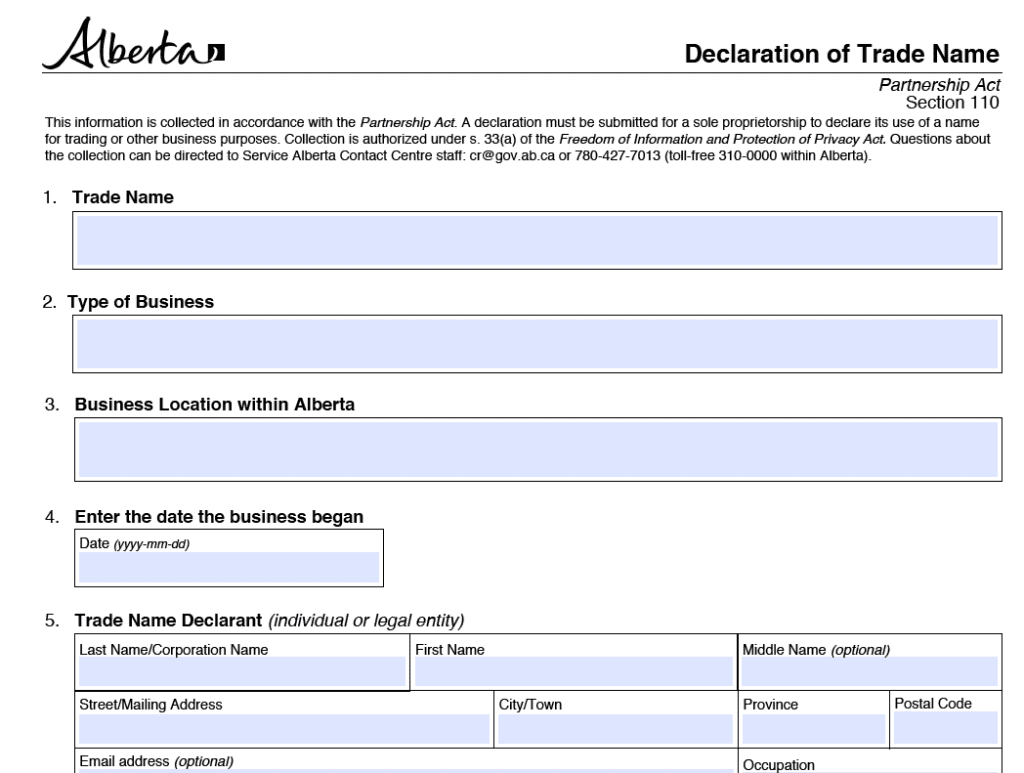
You also need to provide your details as the trade name declarant. This includes your name, address, email address, and occupation. After providing these details, a statement of declaration section gets auto-filled with the ‘name of declarant’, and ‘trade name’ information you provided.

The final section of the form is for the authorized representative or signing authority for the business to provide their name and sign the form. The signing authority can be an agent, a business owner, or a solicitor.

When the form is completed, you will submit it to an authorized corporate registry service provider. The corporate registry will then file your information with the registrar of corporations in compliance with the Partnership Act.
Partnerships
For partnership businesses, you will need to fill and submit the declaration of partnership form to an authorized corporate registry service provider. In the form, you will provide the partnership name, business location in Alberta, the start date of the business, and the type of business.
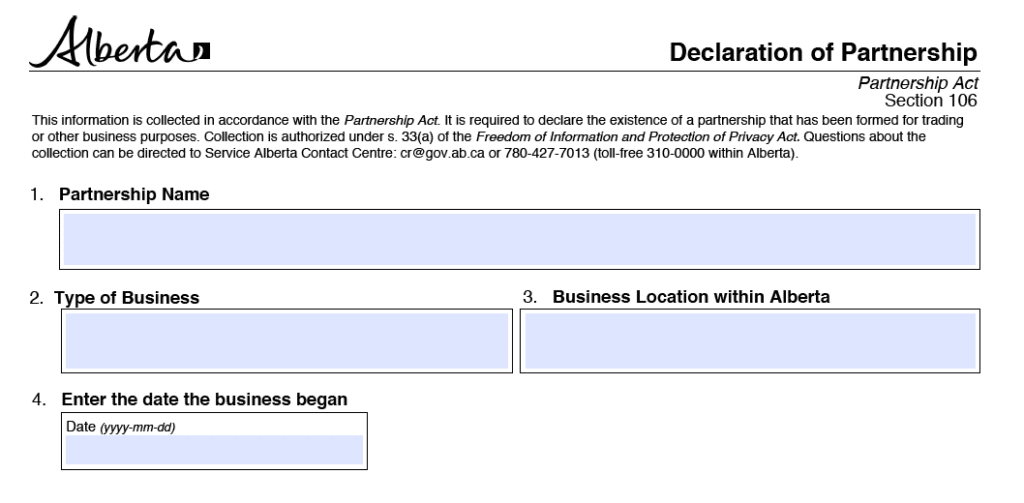
You will be required to provide information about the termination clause of your partnership business. You can select whether the partnership agreement will exist indefinitely or have an expiry date. If the partnership may get terminated at any time, you will need to provide the termination date in the form as shown below.

Next, you have to provide the name of all the partners in the business, their addresses, occupation, and email address (the email address is optional). The final section requires you to provide information on an authorized representative or signing authority for your partnership business.

If you appoint a designated authority to complete the business registration for you, they have to provide proof of identification to the corporate registry service provider to complete the registration. Where applicable, you may need to fill and submit the Special Authority to Execute a Declaration form.
You will need different registration forms for other partnership types, such as the limited liability partnership and the limited partnership. You can register your limited partnership business in Alberta if your business home province is Saskatchewan, Manitoba, or British Columbia using Alberta’s online extra-provincial registration at no cost. You also have the option to apply directly in these provinces.
To register for a limited liability partnership (LLP), such as a law firm or an accounting business, you need to provide permission from the Alberta governing body of your profession. If your LLP is an extra-provincial business, you must provide proof of active registration in your business home jurisdiction and original copies of your registration documents. If your limited liability partnership’s home jurisdiction is in British Columbia, Manitoba, or Saskatchewan, and you want to register your business in Alberta, you need to contact your province to inquire about the specific processes required.
Final registration step
After providing your business name, Alberta NUANS report (if applicable), valid identification, and paying the required fees, your business information will be recorded in the corporate registry if you meet all requirements. The corporate registry will send your proof of filing. You will also receive an email notification when your federal business number is issued, if applicable.
Incorporating a business corporation
After choosing a unique, descriptive, and legal name for your business corporation and obtaining an Alberta name NUANS report, you will need to fill out the Articles of incorporation form. In this form, you have to provide the name of your corporation, the classes of shares, and any maximum number of shares that the corporation is authorized to issue. The articles of incorporation form will include details of the rights, privileges, restrictions, and any conditions attached to each class of shares.
You also need to provide information on any share transfer restrictions, the number of directors your business has, and the minimum and maximum number of directors your corporation may have.
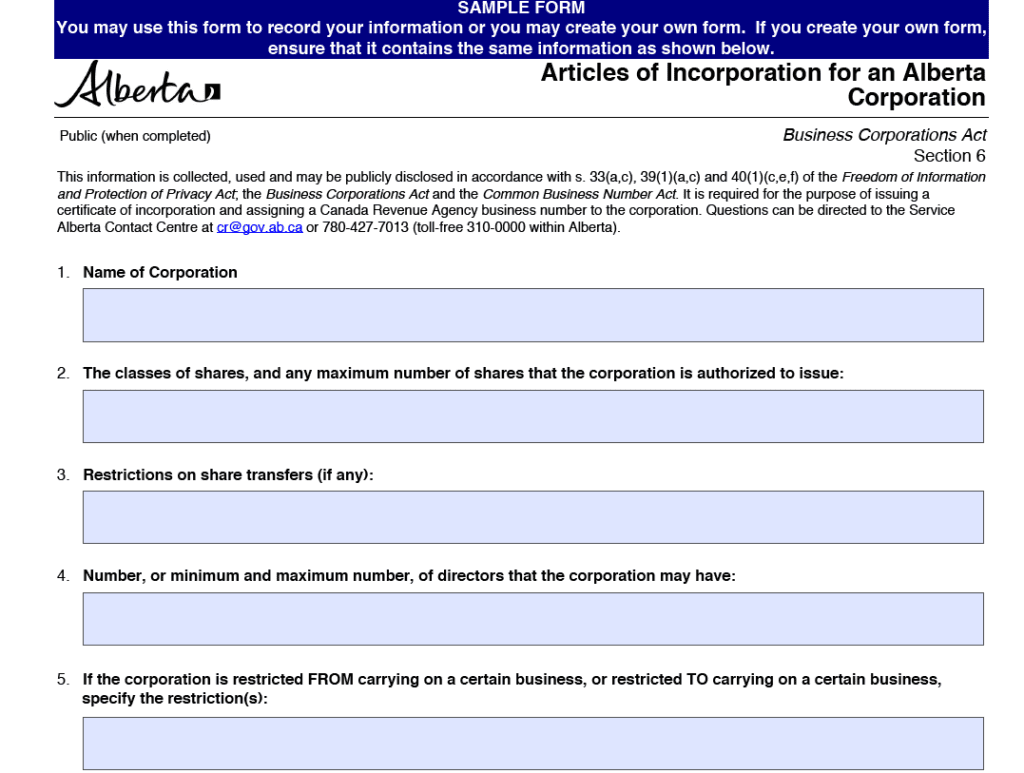
If your company has restrictions, you need to specify this in the articles of corporation form. The final step requires you to provide details of an authorized representative or signing authority for your business corporation.

After completing your articles of incorporation form, you need to record your corporation’s address using the notice of address form as shown below.
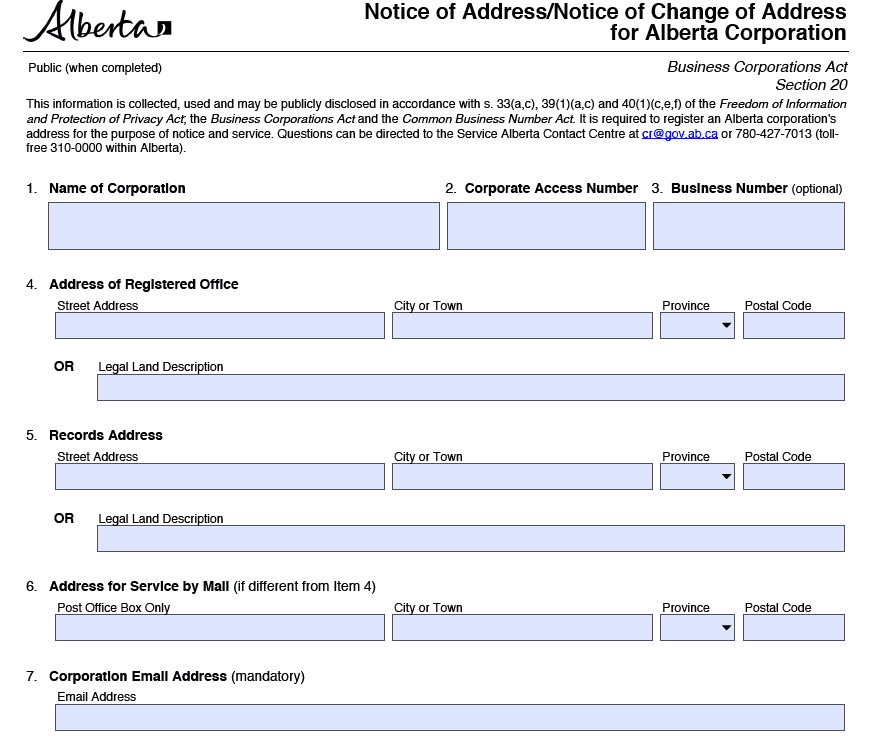
You also need to elect or appoint at least one director for your business corporation. Provide details of your company’s directors using the notice of directors form.
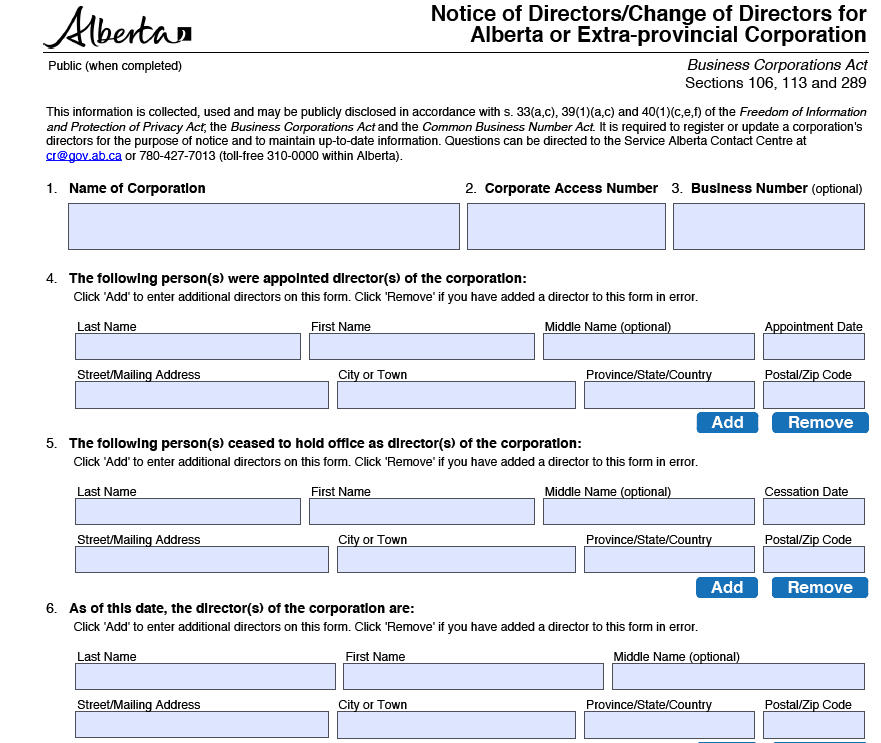
In addition to appointing directors, you are required to appoint an agent for service to accept notices and documents on behalf of your corporation. You can provide details about the agent for service using the notice of agent for service/change of agent for service for an Alberta or extra-provincial corporation form.
To complete your business incorporation, you will need to submit the completed articles of incorporation form with a notice of address, a notice of directors, a notice of agent for service for Alberta or extra-provincial corporation, a valid ID, a notice of English/French name equivalency form (if applicable), your NUANS report (not older than 90 days), and the applicable fees.
All incorporation documents and applicable fees are submitted to an authorized corporate registry service provider. After submitting your business registration documents, the corporate registry service provider will apply for a business number for your corporation from the Canada Revenue Agency (CRA). You will receive your business corporation number within seven to ten days of submitting your incorporation documents.
What is the cost of registering a business in Alberta?
To register your business name, corporate Registry service providers charge a government fee and a service fee. Service Alberta provides an updated list of corporate registry fees. As of January 2022, these are the applicable government fees to register a business in Alberta.
| Business Registration Services | Government Fee |
| Incorporate Alberta corporation | $275 |
| Register extra-provincial corporation | $275 |
| Register extra-provincial non-profit with exemption | $75 |
| Register limited liability partnership | $50 |
| Register limited partnership | $50 |
| Register partnership | $10 |
| Register trade name | $10 |
| Register English/French name equivalency | $50 |
The authorized corporate registry service provider determines their maximum service fee charges, and this can vary by provider.
Using a business account for your company
To open a business account in Alberta, you will need to provide business registration documentation and details, if applicable. If you are using a name that is not your personal name for your sole proprietorship business, you will need to provide your trade name registration details before you can open a business account.
Why get a business account? With a business account, you can track all business income and business expenses. You can also get a business credit card to facilitate your business operations.
Here Are the Best Credit Cards for Your Business in Canada
Business Platinum Card® from American Express
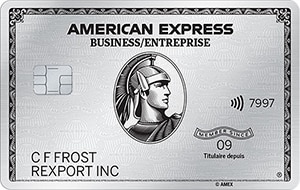
Annual fee: $499
Supplementary cards: $199 for Platinum, $50 for Gold
The American Express Business Platinum Card is a great credit card for running your business. The card has no pre-set spending limit, and you can receive up to 110,000 welcome bonus points when you open your business account. You will have to pay an annual fee of $499, which may be tax-deductible when filing your business taxes.
The Business Platinum Card gives you access to the Business Platinum Card with a supplementary card fee of only $199 annually and the Business Gold Card for $50 annually.You have a flexible payment option to pay a portion of your credit card balance over time with interest.
American Express Business EdgeTM Card
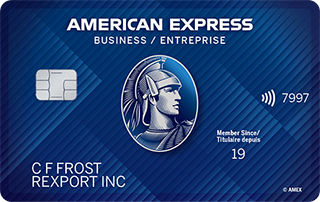
Annual fee: $99
Supplementary cards: $0
The American Express Business Edge card gives you up to 57,000 bonus membership rewards points in the first year of your card membership. You have to pay an annual fee of $99. With the American Express Business Edge card, you can receive fund advances at a rate of 21.99% and make purchases at a rate of 19.99%.
American Express®Business Gold Rewards Card
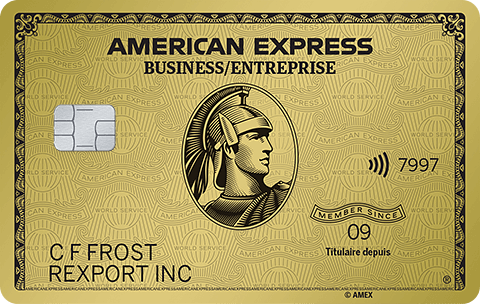
Annual fee: $199
Supplementary cards: $50
You can get up to 110,000 rewards points when you use the American Express Business Gold Rewards Card. The card has no pre-set spending limit and comes with an annual fee of $199, which may be tax-deductible. You also get a supplementary card for a fee of $50 and a flexible payment option to pay a portion of your credit card balance over time with interest.
American Express® AIR MILES®* for Business Card

Annual fee: $180
Supplementary cards: $50
The American Express Air Miles for Business Card gives you a welcome bonus of 2,000 AIR MILES reward miles. The card has an annual fee of $180 and a supplementary card annual fee of $50. You also earn 1 mile for every $10 spent at eligible Air Miles partners, or 1 mile for every $15 spent everywhere else.
American Express® AIR MILES®* Gold Business Card
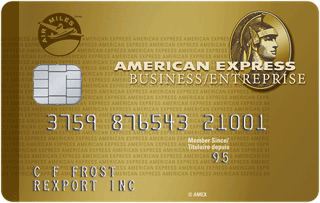
Annual fee: $0
Supplementary cards: $0
The American Express AIR MILES Gold Business card has no annual fee. You can receive free supplementary cards for your employees. The product terms for using this card are 19.99% on purchases and 21.99% on funds advances.
Frequently asked questions
A federal business incorporation may be beneficial if you carry out business operations in multiple provinces in Canada. A federal incorporation protects your business trade name across Canada.
Yes, you can choose to incorporate your small business even if you are the only employee. You will need to follow the articles of incorporation process, get an Alberta business name NUANS report, provide other required documentation, and pay the applicable fees.
The registered office for your business and your records address needs to be physically located in Alberta. A physical address in Alberta enables your business to receive legal documents.
If you have a limited partnership or a limited liability partnership registered in British Columbia, Manitoba, or Saskatchewan, and you want to carry out business operations in Alberta, you can register your business using the extra-provincial business registration process.
https://www.alberta.ca/register-business-name.aspx#jumplinks-2
https://www.alberta.ca/incorporate-alberta-corporation.aspx


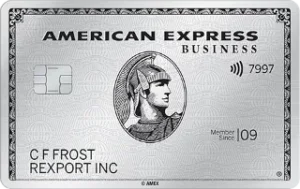
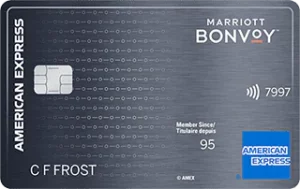
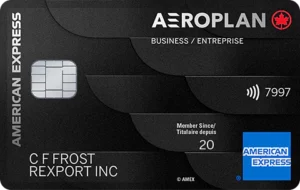
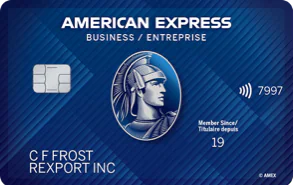
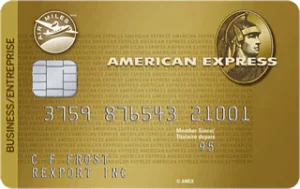












About The Author: Arthur Dubois
Passionate about personal finance and financial technology, Arthur Dubois is a writer and SEO specialist at Hardbacon. Since his arrival in Canada, he’s built his credit score from nothing.
Arthur invests in the stock market but doesn’t pay any fees because he uses National Bank Direct Brokerage online broker and Wealthsimple’s robo-advisor. He pays for his subscriptions online with his KOHO prepaid card, and uses his Tangerine credit card for most of his in-store purchases. When he buys bitcoins, it’s with the BitBuy online platform. Of course it goes without saying that he uses the Hardbacon app so that he can manage all of his finances from one convenient place.
More posts by Arthur Dubois